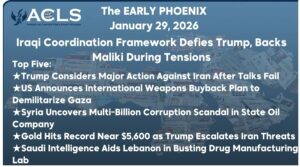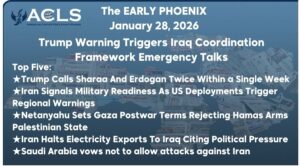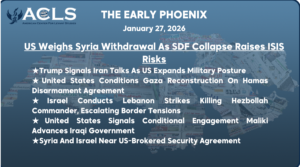August 1-6, 2024
-
Russia Delivers Advanced Radars, Air Defense Systems to Strengthen Iran
Russia has begun supplying advanced air defense equipment and radars to Iran in response to Tehran’s request for assistance. Sergei Shoigu, Russia’s Secretary of the National Security Council and former defense minister, arrived in Tehran to deliver the equipment. Invited by his Iranian counterpart, Ali Akbar Ahmadian, Shoigu met with President Masoud Pezeshkian and senior military officials to discuss bilateral cooperation, regional issues, and security relations. Russia’s condemnation of Haniyeh’s killing was seen as a gesture of support for Iran’s stance against Israel. The visit underscores Moscow’s commitment to its strategic alliance with Iran, with Shoigu playing a key role in strengthening ties and potentially escalating tensions with Israel.
-
Jordan Acts as Mediator, Relays U.S. Message to Iran and Vice Versa
Following Egypt’s declaration to an Israeli delegation that it would not join a regional military coalition against a potential Iranian attack on Israel, President Biden called King Abdullah II of Jordan to deliver a message to Iran, emphasizing the need to avoid escalation. Subsequently, Jordanian Foreign Minister Ayman Safadi visited Iran, marking the first high-level delegation from Jordan to the Islamic Republic in twenty years. Safadi delivered King Abdullah II’s message to President Masoud Pezeshkian, who condemned the assassination of Hamas leader Haniyeh but insisted that Iran is not seeking to escalate regional tensions, though it feels the need to “punish” Israel to prevent further instability. “Iran seeks to establish stability in the region, but this will only come with punishing the aggressor and creating deterrence against the adventurism of the Zionist regime,” Foreign Ministry spokesman Nasser Kanaani said Monday, adding that action from Tehran is inevitabl. Iran’s Foreign Ministry also summoned ambassadors and heads of missions in Tehran for a meeting with acting Foreign Minister Ali Bagheri Kani on Monday to reiterate Iran’s intention to respond to Israel. Amid escalating disputes, including drug trafficking allegations by Iran-allied factions and Tehran’s direct attack on Israel, which Jordan firmly addressed, the meeting aimed to enhance relations.
General Erik Kurilla is set to visit Jordan and several Gulf nations to strengthen military ties and regional security cooperation. This visit underlines Jordan’s strategic importance, particularly highlighted during their critical role on April 13, when they intercepted Iranian drones aimed at Israel and facilitated U.S. and Israeli defensive measures through their airspace.On Friday, the Pentagon announced it would move a fighter jet squadron to the Middle East and maintain an aircraft carrier in the region as part of steps it is taking “to mitigate the possibility of regional escalation by Iran or Iran’s partners and proxies”.
-
Tehran Chaos Follows Assassination of Hamas Leader Haniyeh
Eyewitnesses reported the assassination of Hamas leader Ismail Haniyeh at his Tehran residence, highlighting significant security lapses and chaos in the Tochal mountain area. Initial IRGC claims of a “projectile from the air” were revised to confirm a short-range projectile from the Tochal mountains. An extensive investigation led to over twenty arrests, including senior intelligence officers and military officials. Experts debated the methods used, including long-distance missile, submarine, or pre-planted explosive, doubting a ballistic attack due to minimal damage. Dr. Samir Ghattas highlighted a significant breach in Iran’s national security, suggesting deep Israeli intelligence penetration. He proposed insider information was needed for an explosive device. Khaled Qadoum detailed the chaos following the assassination, while Brigadier General Ya’rab Sakhr emphasized skepticism about Iran’s responses and the contradiction in Iran’s posture despite avoiding full-scale war. Analysis included theories from Iran, Israeli authorities, and the CIA, discussing methods like the Hellfire RX-9 missile’s precision and tracking via laser guidance and mobile phone signals.
-
Iran’s Qassem Soleimani Force: Regional Threat Unveiled
Iran has formed the ‘Qassem Soleimani Forces,’ a new military unit named after the former IRGC Quds Force leader. Comprised of 10,000 fighters from Iranian proxies, including the Houthis in Yemen and groups from Lebanon, Iraq, and Syria, this force aims to centralize Iran’s regional influence. Sources reveal that 20% of its members are Houthis, with the remainder drawn from various pro-Iranian factions. Trained in camps in Iraq and Iran, the group seeks to strengthen Iran’s ‘Axis of Resistance.’ Despite no official confirmation from Tehran, the force’s establishment indicates Iran’s ongoing strategic consolidation in the region.
-
Iran Faces Gas Shortage as Electricity Crisis Intensifies
Iran is grappling with a severe gas shortage amid a summer electricity crisis, leading to warnings of a worsening situation by winter. With gas demand expected to rise significantly, the Iranian Gas Engineering Association’s Manouchehr Daftarian urged action to address the imbalance. Iran’s gas reserves are extensive, but development has lagged, particularly in the South Pars field. Gas demand has surged due to residential and power plant needs. The government has struggled to invest adequately in gas infrastructure, leading to increasing shortages that threaten economic stability and energy security.
=================
📌 In case you missed it,
📰 THE EARLY PHOENIX August 1, 2024
=================
🔗 Follow the latest news from the American Center for Levant Studies via Google News



